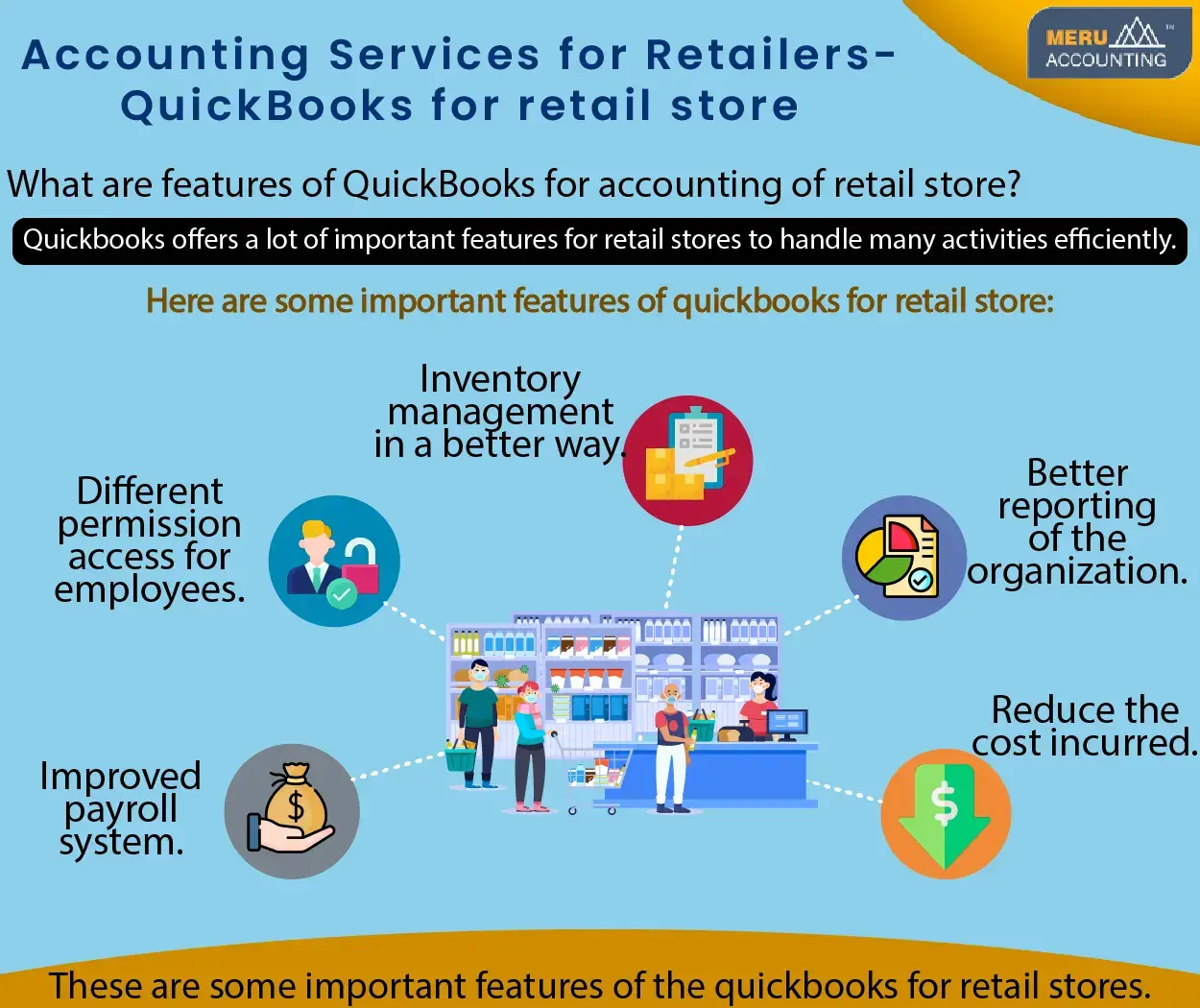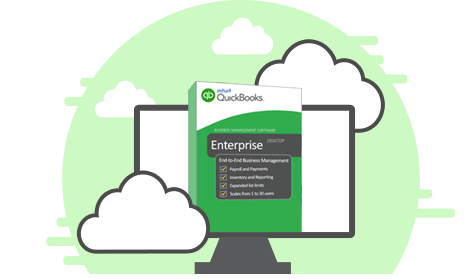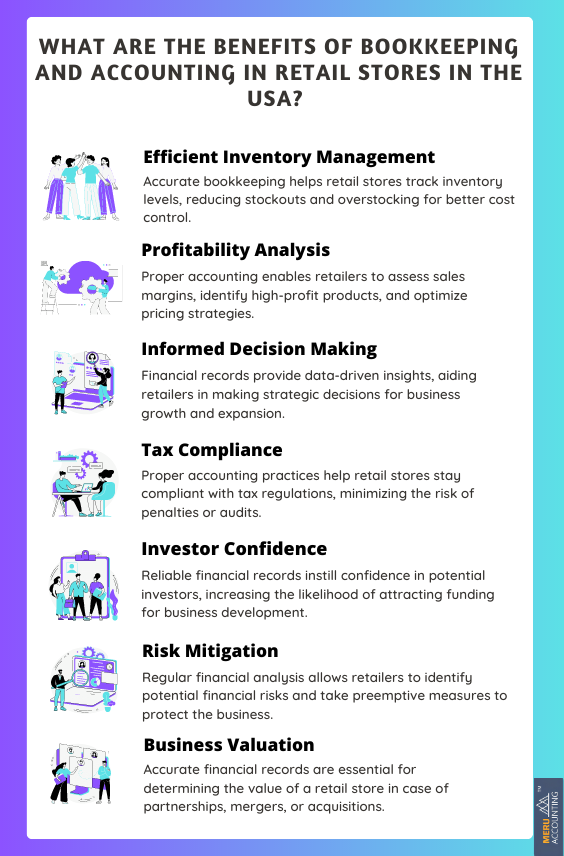Accounting and Bookkeeping for Retail Stores

A retail business needs to do different types of activities on a daily basis to ensure the efficient running of the business. Some of their important activities include product pricing, stock inventory, proper cash flow management, tax management, payroll management, paying bills, etc. Proper tracking of all these activities at every level is important for this business. Apart from these main activities, accounting for a retail store is equally important for this business to run efficiently. As the business structure of retail businesses is comparatively different, there is a different pattern followed in these businesses.
However, retail accounting is not that simple, you need a knowledgeable and experienced individual who can handle the activities efficiently. Many retail businesses find it difficult to find expert accounting individuals to handle their accounting work. So, outsourcing the accounting service for retail is one of the better ways to get quality accounting. If you have a retail store and are looking for proper accounting software then QuickBooks is a better option. Quickbooks for retail stores can help you do all the relevant accounting tasks efficiently.
Features of Quickbooks that will benefit Retail Accounting
Quickbooks has some nice features that can benefit the accounting for retail stores.
Here are some important features of QuickBooks for retail stores:
1. Permissions for Each Role
- A retail store is a kind of business where there are several employees working on different levels. Also, one single retail business can have different branches at different locations. So, it becomes important to provide and deny specific permissions for accounting to particular individuals. Quickbooks has a wonderful way to provide and deny specific roles to particular individuals granted by admins.
2. Better Inventory Management
- Proper management of inventory is one of the crucial aspects of every retail business. It helps to properly track the inventory and make product availability easy. Quickbooks has a wonderful ability to handle the inventory of the retail business efficiently. It can do several activities like inventory tracking, proper shipping of the products, automating several inventory management processes, etc.
3. Better Payroll System
- A better-enhanced payroll system is very critical for every retail business. Quickbooks offers different aspects of the payroll system like direct deposit, creating payroll tax reports, salary payments of employees, etc.
4. Better Reporting
- Reports help business owners and managers to understand business insights better. Quickbooks has wonderful features for creating better reports about financial health, marketing output, sales, employee performances, taxes, etc. The reports provided with QuickBooks for retail stores can help to make important business decisions for the retailers better.
5. Cost Reduction
- Quickbooks can reduce the total cost incurred in the accounting process to a great extent. It can reduce the number of employees needed for manual accounting, eliminate paperwork, automate most tasks, and have several other advantages.
These are some of the important features offered by QuickBooks for accounting for retail stores. If you find it difficult to work on QuickBooks then you can outsource the task to any expert agency.
Accounts Junction provides accounting services for retail businesses professionally. They use accounting software like QuickBooks for retail stores that can handle all the activities of retail business better. They have proficient staff who have handled the accounting for retail business efficiently. Accounts Junction is a proficient accounting service-providing agency around the world.

Role of Bookkeeping and Accounting in Retail Stores in the USA

1. Streamlined Bookkeeping Processes:
- Implementing cloud-based accounting software for real-time data access and collaboration.
- Automating routine bookkeeping tasks to save time and reduce errors.
2. Essential Bookkeeping Tasks for Retail Stores:
- Recording daily sales transactions, including cash, credit card, and other payment methods.
- Tracking inventory levels and updating product costs for the cost of goods sold (COGS) calculations.
- Monitoring and categorizing operating expenses, such as rent, utilities, and employee wages.
3. Leveraging Technology for Inventory Management:
- Utilizing point-of-sale (POS) systems integrated with accounting software to track sales and inventory in real time.
- Adopting barcode scanners and RFID technology for efficient inventory tracking.
4. Retail-Specific Financial Metrics:
- Identifying key performance indicators (KPIs) for retail success, such as inventory turnover and gross margin.
- Analyzing sales trends and customer behavior to optimize product offerings.
5. Financial Planning and Budgeting:
- Creating comprehensive budgets for various retail activities, including marketing and promotions.
- Planning for seasonal fluctuations and incorporating contingency plans for unexpected events.
6. Cash Flow Optimization Strategies:
- Implementing cash flow forecasting to anticipate cash needs and prevent cash shortages.
- Negotiating favorable terms with suppliers and managing payment terms to maintain a healthy cash flow.
7. Fraud Prevention and Internal Controls:
- Establishing internal controls to safeguard against theft, fraud, and accounting errors.
- Conduct regular audits to ensure compliance and detect potential irregularities.
8. Financial Analysis for Growth:
- Using financial data to identify expansion opportunities, such as opening new store locations or launching e-commerce platforms.
- Assessing the return on investment (ROI) for marketing campaigns and initiatives.
9. Outsourcing vs. In-house Accounting:
- Evaluating the benefits of outsourcing accounting tasks to specialized professionals.
- Weighing the pros and cons of maintaining an in-house accounting team for retail stores.
In conclusion, accurate accounting is a fundamental pillar for the success and growth of retail stores in the USA. The benefits of maintaining precise financial records cannot be underestimated, as they directly impact various aspects of retail operations. From inventory management and pricing strategies to tax compliance and financial planning, accurate accounting serves as the bedrock of informed decision-making.
For retail stores looking to optimize their financial management, Accounts Junction emerges as a reliable and valuable ally. With our expertise in accounting and bookkeeping, Accounts Junction provides tailored solutions to retail businesses, ensuring accurate tracking of inventory, sales, expenses, and other financial data. By utilizing modern accounting software and technology, we streamline financial processes, providing real-time access to critical financial information.
Incorporating Accounts Junction's expertise into retail store management is not just a choice; it is a wise investment in the future of the business. With the power of accurate accounting at our disposal, retail stores can drive growth, enhance customer experiences, and stay ahead of the competition in this ever-evolving industry.
What type of information should be tracked
Tracking the right information is crucial for any retail store to effectively manage its finances and make informed business decisions. Here are some key types of information that should be tracked:
1. Sales Data:
- Keeping track of daily sales figures, including total revenue, individual transactions, and sales by product or category, provides valuable insights into customer preferences and helps identify top-performing products.
2. Expenses:
- It's important to meticulously record all expenses related to running the retail store such as rent, utilities, employee wages, marketing costs, inventory purchases, etc. This allows you to accurately calculate your profit margins and determine areas where you can cut costs or improve efficiency.
3. Inventory Levels:
- Monitoring your inventory levels in real time enables you to avoid stockouts or excess inventory. Tracking the quantities on hand for each product helps with reordering decisions and prevents lost sales due to unavailable items.
4. Cost of Goods Sold (COGS):
- Calculating COGS is essential for understanding the profitability of each item sold. This involves tracking the direct costs associated with producing or acquiring goods for sale, including materials cost and labor expenses.
5. Accounts Receivable/Payable:
- Keep a record of outstanding customer payments (accounts receivable) as well as amounts owed to suppliers/vendors (accounts payable). Timely tracking ensures smooth cash flow management and avoids late payment penalties.
6. Customer Data:
- Collecting data on customer demographics, buying patterns, and loyalty programs participation can help tailor marketing efforts toward specific target audiences better understand consumer preferences
Diligently tracking these types of information using accounting software or bookkeeping methods suited for your business type will provide actionable insights necessary for making strategic business decisions.
| # | Account Number | Account Name | Account Type |
|---|---|---|---|
| 1 | Bank & Cash Accounts | ||
| 2 | 1000 | Bank & Cash AccountsBank & Cash Accounts | Bank |
| 3 | 1001 | Operating Bank AccountOperating Bank Account | Bank |
| 4 | 1002 | Petty CashPetty Cash | Bank |
| 5 | Accounts Receivables |
Hospitality industry has to provide better services to their customers to ensure their business has sustainability. The better they provide service, they have better chances of growing their business. There are broad categor...
Read MoreLast two decades have seen a considerable change in the trucking industry that has changed the working pattern of trucking companies. This has also changed the needs of the finance and accounting pattern of trucking companie...
Read MoreIndependent contractors will always try to find new projects with bigger ticket sizes to grow their business. Although most of the contractors may have a systematic way of workflow in their work areas, however, very few have...
Read MoreEvery small business owner understands the importance of bookkeeping in ensuring accurate accounting. This necessity for effective bookkeeping is especially critical in petrol stations, where a significant number of transact...
Read MoreA manufacturing company must use a predetermined quantity of raw materials, work-in-process, and finished goods in the course of its operations, and any ending balances must be fairly valued to be recorded on the balance she...
Read MoreOne of the primary functions of accounting is to monitor the business process. This is essential for all industries, including distribution and trading companies. Accounting, also known as internal control, is a tool used to...
Read MoreAccounts Junction provides the best insurance accounting experts for insurance agency accounting and bookkeeping. Our team has years of experience working with insurance agencies. We understand the unique requirements and pr...
Read MoreWhen you are running an event management company, you need to have a very organized approach. It is also important that you are managing your finances properly with proper management of bookkeeping and accounting. Many Event...
Read More
Accounts Junction's bookkeeping and accounting services
